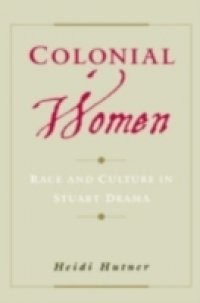Colonial Women examines the women-as-land metaphor in English colonial dramatic literature of the seventeenth century, and looks closely at the myths of two historical native female figures--Pocahontas of Virginia and Malinche of Mexico--to demonstrate how these two stories are crucial to constructions of gender, race, and English nationhood in the drama and culture of the period. Heidi Hutner's interpretations of the figure of the native woman in the plays of Shakespeare, Fletcher, Davenant, Dryden, and Behn reveal how the English patriarchal culture of the seventeenth century defined itself through representations of native women and European women who have "gone native." These playwrights use the figure of the native woman as a symbolic means to stabilize the turbulent sociopolitical and religious conflicts in Restoration England under the inclusive ideology of expansion and profit. Colonial Women uncovers the significance of the repeated dramatic spectacle of the native women falling for her European seducer and exploiter, and demonstrates that this image of seduction is motivated by an anxiety-laden movement to reinforce patriarchal authority in seventeenth-century England.

